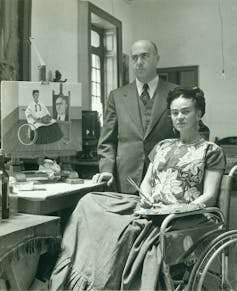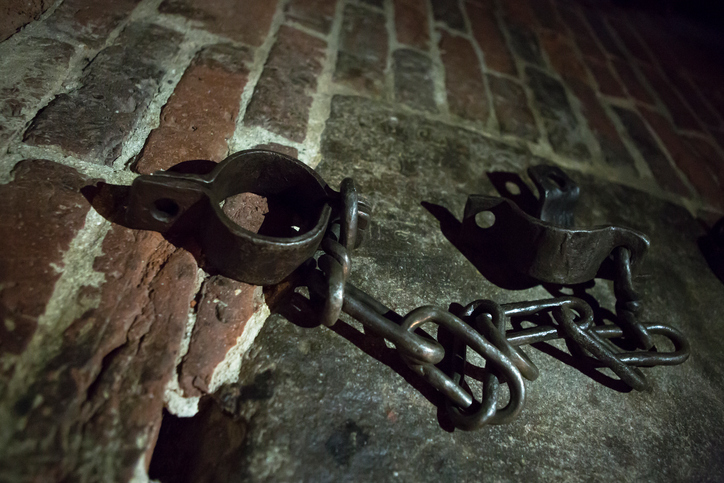
by Mwikali Munyao | Apr 24, 2022 | Headline News, Prayers & Devotionals |
John 8:31-38 NLT
31 Jesus said to the people who believed in him, “You are truly my disciples if you remain faithful to my teachings. 32 And you will know the truth, and the truth will set you free.”
33 “But we are descendants of Abraham,” they said. “We have never been slaves to anyone. What do you mean, ‘You will be set free’?”
34 Jesus replied, “I tell you the truth, everyone who sins is a slave of sin. 35 A slave is not a permanent member of the family, but a son is part of the family forever. 36 So if the Son sets you free, you are truly free. 37 Yes, I realize that you are descendants of Abraham. And yet some of you are trying to kill me because there’s no room in your hearts for my message. 38 I am telling you what I saw when I was with my Father. But you are following the advice of your father.”
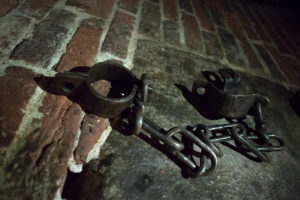
Slavery is a terminology that creates discomfort in conversations because it represents one of the worst atrocities a human life can undergo. It is easier to deny or be hush about it. Openly acknowledging that the human mind is capable of manufacturing an ideology to oppress and detain, mistreat and dehumanize another human being can be difficult for the mind to wrap around. Yet Jesus was not afraid to address slavery head on.
Jesus reveals the type of mentality we should have towards sin which is detest, avoid and conquer it. Sin is a master that loves slaves. There is nothing good that comes out of it. It will seduce, manipulate, use, and deplete you. And just when you think you are done, it will create a small sense of relief to trick you into thinking you are okay, only for you to succumb to another cycle that keeps going on and on.
It is easy to look at slavery from the perspective of what you know from history. However, there is a yoke of slavery that lurks every day in your life and that yoke is sin. Jesus desires for you to be free and live with no fear.
Have you been battling something that keeps making you sin over and over again? Are you accustomed to it to the point of not desiring to seek freedom? You have to win in the mind and believe that you can be free and stay free. It is not by your might, but through Jesus Christ.
You deserve to see what a life of freedom looks and feels like. There is no human you will ever meet who loves and prays for slavery. So why should you accept sin as your master when you have the option of freedom? Jesus is able free you and shares tools through His Word on how to stay free. Release yourself from the yoke of sin, and step into the freedom that God desires for you.
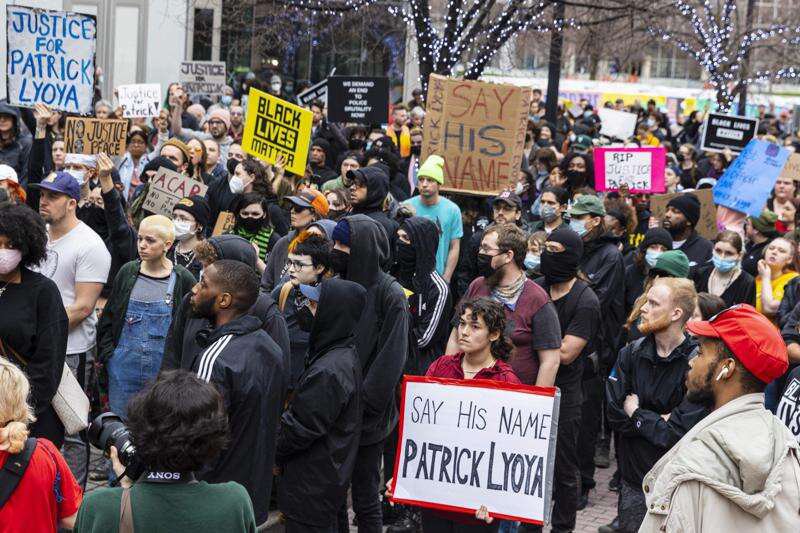
by Kathryn Post, RNS | Apr 21, 2022 | Commentary, Headline News, Social Justice |
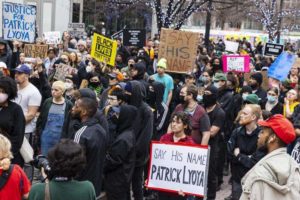
(RNS) — Pastors in Grand Rapids, Michigan, are taking action as the city reels in the aftermath of the fatal shooting of 26-year-old Patrick Lyoya by a Grand Rapids police officer on April 4. Video footage of the shooting was released on Wednesday (April 13), sparking protests outside the city’s police department.
Lyoya, who is Black, was pulled over last week for a mismatched license plate. Video footage shows a white officer shooting Lyoya in the head after a brief scuffle. Lyoya and his family arrived from the Democratic Republic of the Congo in 2014 as refugees, and he leaves behind his parents, two young daughters and five siblings.
In the days since Lyoya’s death, a group of Black pastors in Grand Rapids, called the Black Clergy Coalition, has been organizing community events to promote dialogue, healing and justice.
“We think that our faith perspective is critical in this hour, to not just discuss policy change, which is necessary, but to also discuss the spiritual and faith dynamic,” said Pastor Jathan K. Austin of Bethel Empowerment Church in Grand Rapids. “We must continue to keep our trust in the Father so that people don’t lose trust in this time because of the heartache, the pain.”
On Sunday (April 10), the group helped organize a forum for community discussion in response to Lyoya’s death. The discussion took place at Renaissance Church of God in Christ in Grand Rapids — the location was intentional, according to the church’s senior pastor, Bishop Dennis J. McMurray, who noted the wider church’s historic role in guiding civil rights movements and said the Black Clergy Coalition is drawing on that legacy.
“It was unreal, the level of cooperative dialogue and understanding that took place,” McMurray told Religion News Service. “If these conversations would have started almost anywhere else, the volatility that could be associated to something as devastating as what we’re facing could have been a bomb that goes off that would cause so many other issues.”
The group also helped host a Thursday press conference at the Renaissance Church of God in Christ and a noon Good Friday service at the church, where they took up a collection for the Lyoya family.
The Rev. Khary Bridgewater, who lives in Grand Rapids, said the city’s racial and religious landscape informs how local leaders are responding to Lyoya’s death. Grand Rapids has a population that’s over 65% white and about 18% Black. It’s also the headquarters for the Christian Reformed Church, a small, historically Dutch Reformed denomination, and is home to over 40 CRC churches. According to Bridgewater, leaders shaped by the CRC’s reformed theology are often more likely to advocate for change within existing systems.
According to Bridgewater, “It’s very hard for most CRC churches to look at a system and say, ‘This is wrong, we’re going to act as activists to push the system into a different state.’ They’re more inclined to say, ‘Hey, let’s sit down and have a conversation with the leaders and try to do things differently.’” Bridgewater says this theology can bump up against the Black church’s prophetic tradition of change-making. For this reason, he said, Christian groups in Grand Rapids need to have theological discussions around topics like justice and citizenship.
Nik Smith, a Grand Rapids activist and member of Defund the GRPD, agrees the city’s religious culture is shaping local leaders’ responses.
“The nonprofits are run by Christian folk who are just waiting for Jesus to come, not realizing not only was he here already, but he’s given us things to live by,” said Smith. “So we have to be seeking justice actively in our community. We can’t just say, let’s pray. Prayer is not going to bring Patrick back.”
Smith has been involved in Defund the GRPD since 2020, when the coalition first began advocating for reducing the police budget and refunding over-policed communities. Though Smith doesn’t identify as a Christian as strongly as she once did, she believes the Bible highlights the consequences of earthly authorities wielding too much power and the importance of working to make the world a better place. For Smith, defunding the Grand Rapids Police Department is part of securing a better future.
For years, the city’s police department has been criticized for racial profiling and for drawing guns on Black children. Joseph D. Jones, who is a city commissioner and pastor, told Religion News Service he wants to address police and community relations by looking at “root causes” of socio-economic inequality and other disparities while also addressing training for officers.
“I do believe in the absolute power of prayer,” Jones added. “I’m asking those who do pray … to pray for the family of Patrick, to pray for our city, to pray that angels are encamped around our city to protect our city and to pray that God restore and change the hearts of those who desire to engage in anything that is seen as evil in our country and our world,” Jones said.
Austin of Bethel Empowerment Church said the Black Clergy Coalition has long been advocating for police reform and specifically wants to see better diversity and culture training for officers and changes in how the department responds to police shootings.
“I am going to allow the wheels of justice to roll, and we pray that they roll properly,” said McMurray, who is also part of the coalition. “We are working, but we’re also watching.”
READ THIS STORY AT RELIGIONNEWS.COM
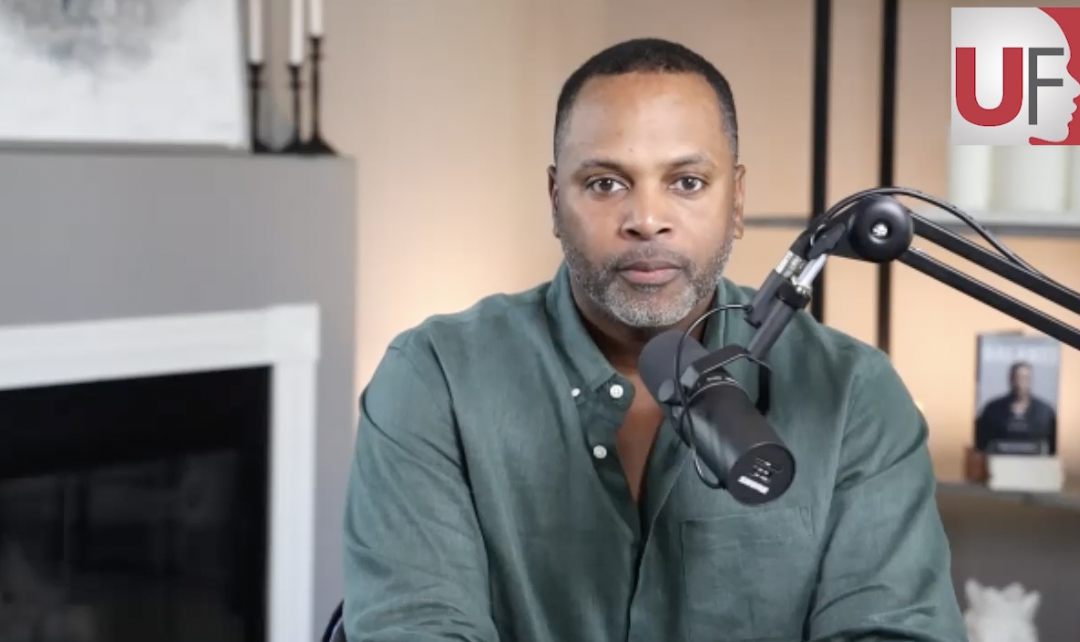
by Allen Reynolds, UrbanFaith Editor | Apr 19, 2022 | Commentary, Faith & Work, Headline News |
UrbanFaith sat down to interview Touré Roberts, the visionary leader and founder of ONE (formerly OneChurch LA) to discuss his new book Balance.
Touré Roberts is a man who wears many hats. He is a husband, father, producer, pastor, author, speaker, and business executive with churches and homes in two cities. His wife Sarah Jakes Roberts who wrote the foreword to his most recent book is one of the most sought after speakers in the country. Saying Roberts needs balance to maintain his success is an understatement. But Touré has uncovered an unconventional approach to balance…as a place to live from. An overview of the book is below.

Imagine learning to tap into the awareness, the sensitivity and highest thought patterns that enable the most successful outcomes in life, love and business. What would your life look like if you were able to break the patterns of inconsistency that keep you from your absolute best? These goals are not only possible—they are what you were made for! In Balance, bestselling author Touré Roberts guides us on the eye-opening journey that unpacks the divine formula that makes this a reality. This illuminating guide brings a unique and eye-opening perspective to the evasive concept of balance.
by Valerie Boyer | Apr 16, 2022 | Headline News, Prayers & Devotionals |
Yesterday, churches around the nation gathered in person and virtually to commemorate the death and murder of Jesus. What a way to die, executed with his boys nowhere around, with the exception of John who he left in the care of his mother. He died in front of his mother. All of these people who loved Jesus, whether at the cross or not, had to live with the fact that they are now living in the world with a dead Jesus. We know now, because of history, that this part is an ongoing story, but even this part has a finality to it. Death is like that. Death is part of the process of living this life, and grief is its own beast of a complicated companion that comes with doing life with someone. These people had to grieve Jesus. God, the Father, had to watch his Son die. God lost His Son. Can you imagine it?
Who were your ones? Who are the people you love and loved so deeply, that your history is now split between before this person and after this person? Did you cry? Do you still cry? How did the gift that is grief show up for you? I believe in our liturgical imaginations, we have created services for almost every other day of Holy Week to commemorate, except for Saturday, because we just don’t know how to sit in grief. Grief can be an all consuming force to deal with, but grief is the price we pay for love, and they were loved. Sunday will get here in its own time, but we should take a page out of the Jesus story in this way too. There’s a reason that grief makes the story.
Theologians will debate about what He’s doing during this time, and the possibility of Him snatching the keys of hell and the people that will rise with him. What we know is that the people left on this side of the river Jordan had to grieve. And that alone is the gift here. The gift is frankly permission to grieve, and to feel feelings. It’s an invitation to learn how to sit in our Satur….sadder-days. It’s an invitation to not run and rush through the grief, but to trust God to get in the grief with you, since God knows what it’s like to live with the loss too. May we all learn how to be still on sadder-days, and hold in tension that this ongoing story, just with the added character of grief.






